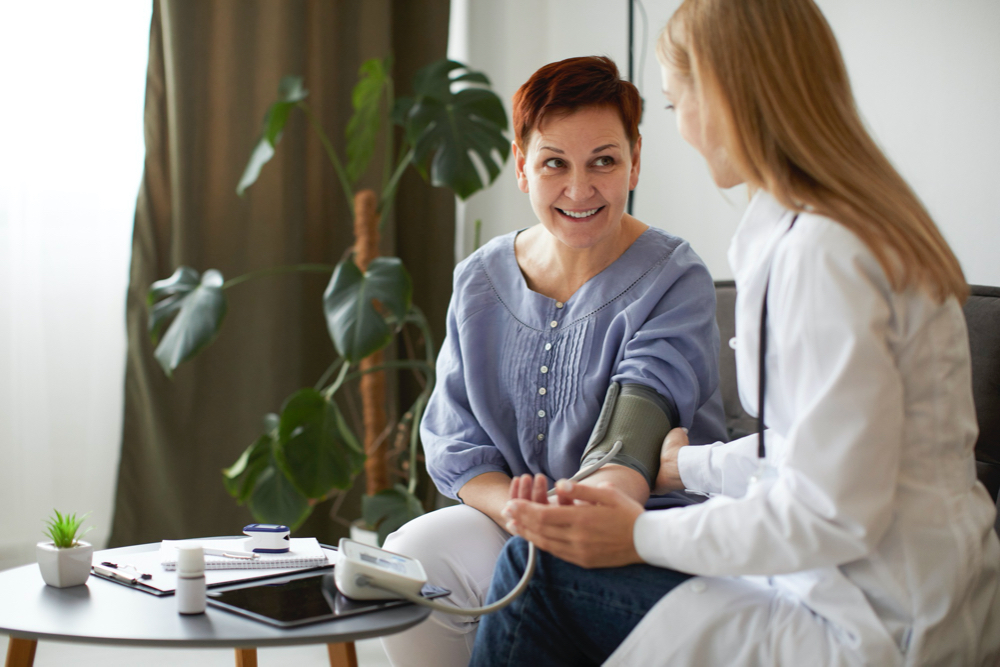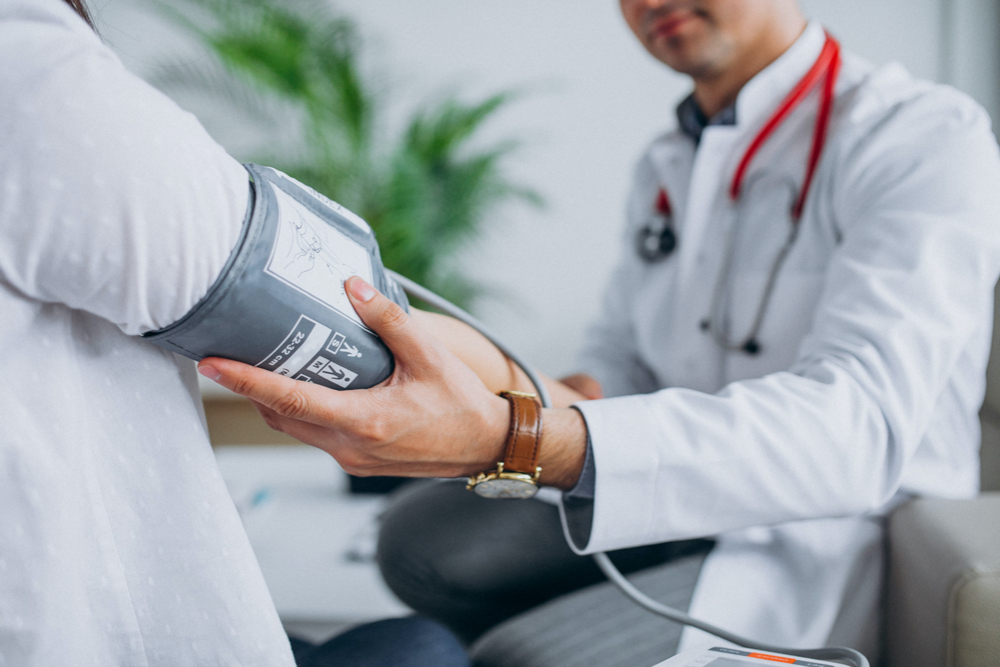- Fast results
- 4,000+ locations
- 4.8 star rating
Need Help? (888) GET LABS



A sudden blood pressure spike can be triggered by external factors. Hence, even healthy individuals can experience it from time to time. You can inadvertently raise your blood pressure by engaging in physical activities, as well as via excess intake of drugs, food, coffee, and alcohol. The same effect can occur during a highly stressful event. In this article, we discuss the causes of a spike in blood pressure and their mechanisms.
Exercise has been known to help manage high blood pressure and even delay the onset of hypertension. However, exercise can be a two-edged sword, depending on the intensity.
A 2023 scientific article by Cureus highlighted exercise-induced hypertension commonly experienced by athletes and healthy individuals engaged in high-intensity exercises. Exercise increases sympathetic activity and heart rate, resulting in a temporary rise in blood pressure. Further, there have been observed changes in the renin-angiotensin-aldosterone system (RAAS) when exercising.
Another possible cause might be impaired endothelial function, where the cells lining the blood vessels don’t let arteries expand to handle more blood. It can result in higher blood pressure during exercise and may be associated with the development of heart disease.
| Takeaway: If you’re into extreme workouts and bodybuilding, it’s crucial to lay down your baseline profile with the help of a healthcare professional and nutritionist. Make sure to take lab workups like the bodybuilder blood test panel. |
Read more about bodybuilding:
Several studies have focused on the relationship between coffee and hypertension. However, the results are mixed with some papers showing evidence that habitual coffee drinking can trigger high blood pressure, while others show that the causal effect is insignificant.
A review of several studies found that drinking more than 3 cups of coffee per day wasn’t associated with hypertension compared with drinking less than 1 cup. However, one to three cups per day of light-to-moderate consumption was associated with a slightly elevated risk.
| Takeaway: Coffee can have varied effects on people. While some people experience palpitations, high blood pressure, and anxiety from caffeine, others do not. Although further studies are underway to establish a causal link between coffee and hypertension, understanding how coffee affects you personally is crucial. If you love coffee, make sure to limit your intake to three cups a day or less. |
Numerous drugs alter your blood chemistry, let alone spike blood pressure. According to a study published in the American Journal of Hypertension, even occasional cocaine use can increase blood pressure, stiffen arteries, and thickened heart muscle walls.
In addition, a study published in the Journal of Clinical Psychopharmacology found that illicit drugs such as cocaine, amphetamines, and ecstasy can cause acute or newly diagnosed hypertension. Cocaine, in particular, is associated with hypertensive crises, heart attacks, arrhythmias, strokes, and seizures.
| Takeaway: Drug abuse leads to multiple health problems that are detrimental to your physical and mental wellness. In this context, high blood pressure is not necessarily the main problem you’ll be facing. Instead, it could indicate other health issues affecting your cardiovascular and nervous systems. With these well-established consequences, stirring clear from these substances or quitting them altogether is the best route you can take. |
Overindulgence in food can put your body in all sorts of health issues, including sudden blood pressure spikes. This has been evidenced by the causative relationship between obesity and hypertension.
In addition, a study conducted by researchers at Lehman College and published in the American Heart Association’s journal Hypertension found that overfeeding, particularly with high-fat diets, can result in increased sympathetic nerve activity (SNA) in rats. This leads to increased blood pressure.
While the study simply established the groundwork for finding the relationship between obesity and hypertension, it’s indicative of a potential mechanism. That said, it’s crucial to be selective of your diet and avoid sedentary activities.
| Takeaway: Overeating leads to obesity, type 2 diabetes, and other conditions that can induce hypertension. In this context, ensuring a well-balanced diet with minimal fats and sodium and rich in fruits and vegetables allows you to have a better relationship with food–as this diminishes cravings and possible food addiction. |
Consuming alcohol is not all bad if done occasionally. In fact, it can have benefits to your health. However, if alcohol intake becomes excessive, it can trigger various types of health problems, including sudden spikes in blood pressure.
A review of multiple studies published in the Current Hypertension Reports shows that reduction of alcohol consumption positively impacts blood pressure management. However, how long these effects are still requires further understanding.
In addition, the risk of hypertension varies between women and men, with women having increased risk starting at moderate alcohol consumption. Other variables are also presented in the study, such as varying impacts of alcohol among races.
| Takeaway: Limiting your alcohol intake can improve your health in many ways. For one, it can help keep your cardiovascular activity at a normal pace, including your blood pressure. If you’re having trouble regulating drinking, keep in mind that you can always seek help from people close to you or from established groups or communities. |
As a result of stress, your sympathetic nervous system is activated, and your adrenaline and cortisol levels rise. These hormones constrict the blood vessels and increase your heart rate. These effects are temporary and have been known not to establish long-term effects. However, chronic stress can lead to other medical conditions that can be a more direct reason for blood pressure spikes.
Your source of stress can be a single event, such as a conflict or financial problem. However, in some cases, it could be triggered by your work environment or home dynamics. In this case, you will need to cope with stress in healthy ways.
| Takeaway: Stress management can help improve your heart health. You can turn to mindful meditation and deep breathing, as well as doing hobbies and other stress-relieving activities to maintain normal blood pressure. |

You can reduce blood pressure during a spike by employing relaxation techniques. Make sure you find a place without any triggers, and practice deep breathing to help dilate your blood vessels.
Drinking water can aid in lowering blood pressure as hydration influences the constriction of blood vessels. But drinking water alone cannot reverse the condition. You also have to address the causes of blood pressure spikes.
Some of the foods that could help reduce blood pressure include garlic, dark chocolate, whole grains, fatty fish, bananas, berries, yogurt, leafy greens, and beet juice. For other ways to manage hypertension, check out our guide on how to lower high blood pressure in four steps.
Sudden blood pressure spikes can be managed and avoided altogether if you understand their triggers well. Extreme physical activities and overconsumption of food, coffee, and alcohol, as well as drug abuse, can contribute to these sudden blood pressure increases. For the best course of action, combine these tips with other steps your doctor recommends.

© Copyright 2025 Personalabs. All Rights Reserved.